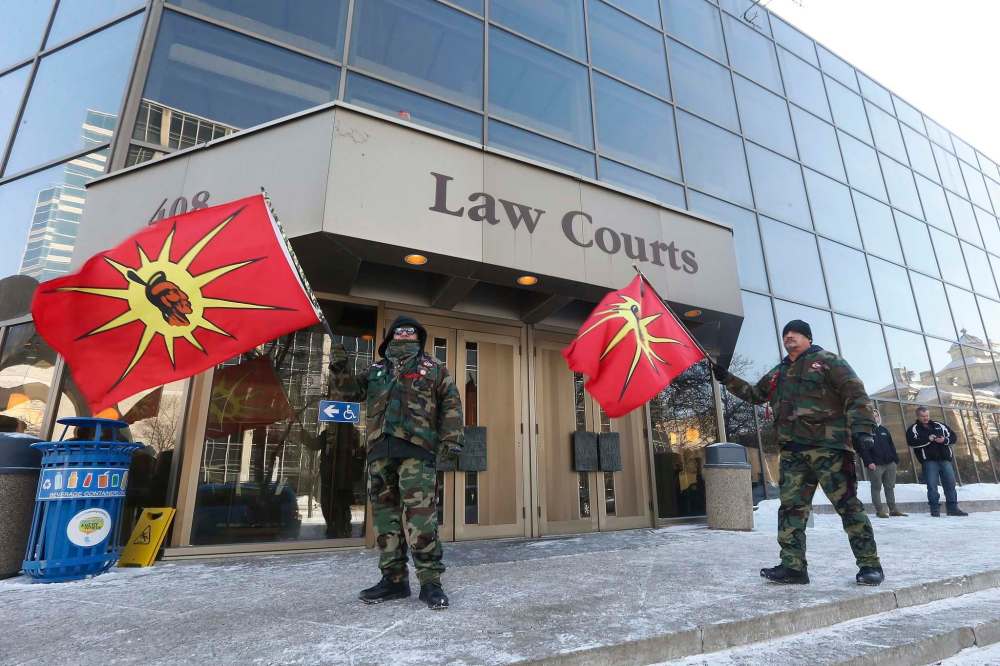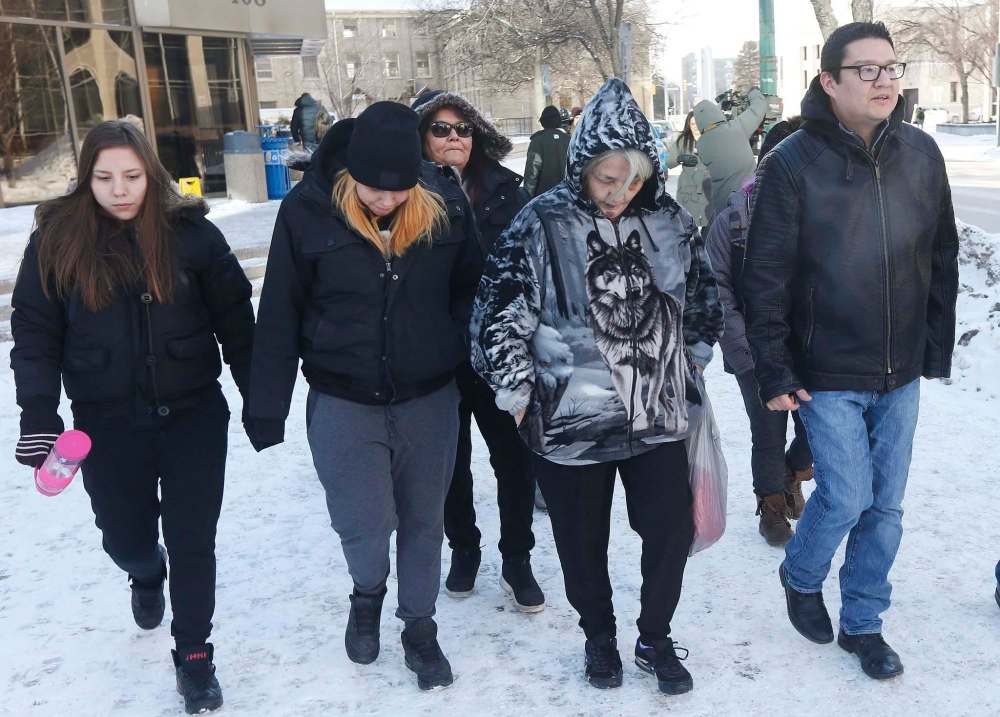Waiting for Cormier verdict the ‘calm before the storm’
Advertisement
Read this article for free:
or
Already have an account? Log in here »
To continue reading, please subscribe:
Monthly Digital Subscription
$0 for the first 4 weeks*
- Enjoy unlimited reading on winnipegfreepress.com
- Read the E-Edition, our digital replica newspaper
- Access News Break, our award-winning app
- Play interactive puzzles
*No charge for 4 weeks then price increases to the regular rate of $19.00 plus GST every four weeks. Offer available to new and qualified returning subscribers only. Cancel any time.
Monthly Digital Subscription
$4.75/week*
- Enjoy unlimited reading on winnipegfreepress.com
- Read the E-Edition, our digital replica newspaper
- Access News Break, our award-winning app
- Play interactive puzzles
*Billed as $19 plus GST every four weeks. Cancel any time.
To continue reading, please subscribe:
Add Free Press access to your Brandon Sun subscription for only an additional
$1 for the first 4 weeks*
*Your next subscription payment will increase by $1.00 and you will be charged $16.99 plus GST for four weeks. After four weeks, your payment will increase to $23.99 plus GST every four weeks.
Read unlimited articles for free today:
or
Already have an account? Log in here »
Hey there, time traveller!
This article was published 21/02/2018 (2849 days ago), so information in it may no longer be current.
As the jury room door closed behind the seven women and four men who are now deliberating on the evidence against Tina Fontaine’s accused killer, Thelma Favel rose from the chair she’s occupied for most of Raymond Cormier’s second-degree murder trial.
Almost every day over the past three weeks, Favel, the woman who raised 15-year-old Tina, has sat right up front, directly across from the jury box, listening, sobbing and soaking in disturbing details of the teen’s last days that have come to light over the course of Cormier’s second-degree murder trial.
On Wednesday afternoon, after Court of Queen’s Bench Chief Justice Glenn Joyal instructed the jury and sent them off to be sequestered until they decide whether 56-year-old Raymond Cormier is guilty of killing Tina, Favel got up and hugged Crown prosecutor Breta Passler. It was one of many moments, this one shielded from jurors, that have long since proven the emotional impact of the case and the lasting power of Tina’s legacy.

Tina’s death sparked a public outcry that renewed calls for a national inquiry into disproportionately high rates of missing and murdered Indigenous women and girls across Canada, and the criminal trial for the man accused of killing her hasn’t happened in a vacuum.
Many of these past cold, winter days, men dressed in camouflage have stood in front of the Law Courts building downtown, waving the red and yellow flags that became a symbol of an uprising, a fight for Indigenous justice, in the Idle No More movement.
“Justice for Tina!” is their refrain.
Those words, written in the snow in front of the courthouse one day while the trial continued, caused Crown and defence lawyers handling Cormier’s case to briefly express concern about outside influence on the jury. Chief Justice Joyal reminded jurors a few times throughout the trial to ignore anything they’ve seen or heard outside the courtroom.
While the jury is sequestered, sheltered from the wider implications of this case, there is “a calm before the storm,” said Manitoba Keewatinowi Okimakanak grand chief Sheila North, speaking to reporters outside the courthouse Wednesday afternoon.
Six years ago, North coined the social media hashtag #MMIW to represent missing and murdered Indigenous women in Canada – an identifier that has since followed an outpouring of news about Tina, from the discovery of her body on Aug. 17, 2014 to Cormier’s arrest in December 2015 to ongoing social media updates on his criminal trial. She was present for the judge’s instructions to the jury Wednesday, after which she said the verdict will be devastating either way.
“I hope that the rest of Canada is looking at this as a chance for all of us to reconcile because I think, you know, what happened to Tina actually brought a lot of Canadians together and started to realize that this issue is real and is happening to real people that are affected every day like this. So it’s important to remember that we’re talking about a real, live child that this happened to, and she’s not a statistic to us,” North said.
“I know that the family, especially Thelma, she doesn’t want any more violence, she doesn’t want any more injustices, she doesn’t want any more grief. She wants to be healed, and I think that’s what we all have to remember, is that we have to keep the peace and maintain the peace no matter what because that’s who we are as people. We’re resilient, we’ve faced so many hardships like this and we’ll make it past this one, too, whatever the verdict is. But it’s going to be hard either way. It’s going to be really hard emotionally, for the family especially, and I hope it is hard for Cormier, too, either way,” she told reporters.

Marilyn Courchene, a band council member of Sagkeeng First Nation, where Tina and her family are from, said it was heartbreaking for her to be in the courtroom to hear the offensive and profane words 56-year-old Cormier used when he talked about 15-year-old Tina, words that were repeated over and over as lawyers, and then the judge, summed up for jurors the case against Cormier this week.
“I couldn’t stand being in there. None of us could,” Courchene told reporters.
“The details, you know, the outbursts of things happening in there, the words that were used that were terrible, who uses those kinds of words against a child?”
As Tina’s relatives and supporters listened in shock to details of Cormier’s sexual attraction to Tina and the words he used to describe her and what he wanted from her, many gasped, wept or cried out in grief. “F—ing sick bastard!” one woman shouted at Cormier, prompting the judge to excuse the jury. He then asked anyone who couldn’t control their emotions to leave the courtroom so as not to distract the jury.
The jury’s work needs to be done properly, Courchene said.
“I’m just hoping that they don’t make a decision so hastily or fast, they take their time, that they’re calm about every situation that was said, and all the witnesses that they’ve seen,” she said.
Courchene said one woman on the jury belongs to “our culture,” suggesting she is Indigenous. Racial backgrounds of jurors can’t be confirmed because Manitoba doesn’t ask prospective jurors for that personal information, but it appears as though some of the jurors are visible minorities.

“We’re talking about a life of a child here. We’re talking about, you know, a child that was taken advantage of, and that’s how I feel. If it was your daughter, I’m sure everyone would be upset about this. And we can’t say, you know, whether Cormier’s guilty or not guilty. We can say there was a child that was taken. That’s what we can say.”
– with files from Melissa Martin
katie.may@freepress.mb.ca
Twitter: @thatkatiemay

Katie May is a general-assignment reporter for the Free Press.
Our newsroom depends on a growing audience of readers to power our journalism. If you are not a paid reader, please consider becoming a subscriber.
Our newsroom depends on its audience of readers to power our journalism. Thank you for your support.
History
Updated on Thursday, February 22, 2018 9:47 AM CST: Changes headline






